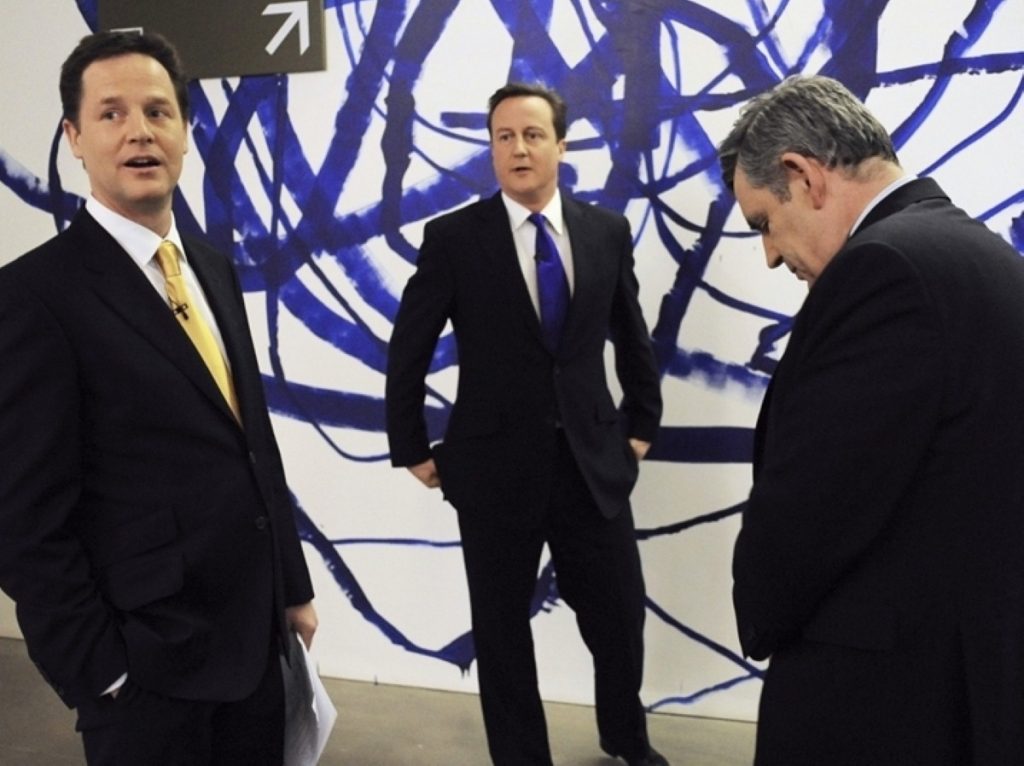Fiery leaders’ debate confirms three horse race
Polls have shown no clear winner from the second leaders’ TV debate, cementing the chances of a hung parliament.
The mixed polls confirm that the 2010 general election is now a three-horse race.
Two polls, both for newspapers owned by Rupert Murdoch, suggested David Cameron won, but three others hinted at a Nick Clegg victory.


“This election will be decided in the last few days,” Mr Brown said this morning.
“It’s wide open now.”
Viewer ratings out today indicated a big fall in the number of people watching, with just four million tuning in compared to last week’s nine million.
All three party leaders intensified their attacks in the debate, with Mr Clegg largely escaping the focused attacks many had anticipated.
Exclusive: Nick Clegg on Nick Clegg
Instead Gordon Brown and Mr Cameron emphasised the disagreements between themselves, with the Liberal Democrat leader flagging up the advantages of a hung parliament.
The second leaders’ debate, hosted by Sky News in Bristol, saw all three figureheads break loose from the tentative approaches which dominated last week’s opening debate.
During a first half focusing on international affairs the leaders returned repeatedly to the dividing lines offered by Europe.
Polls split win between Cameron and Clegg
While Mr Clegg flagged up his past experience as an MEP to demonstrate that “we punch above our weight when we stand together in Europe”, Mr Cameron attacked the Lib Dem for “hypocrisy”.
“These two guys remind me of my two young boys squabbling at bathtime,” the prime minister responded. Mr Clegg accused him of deploying a “pre-prepared line”.
Mr Cameron turned his fire on Mr Clegg by unexpectedly raising the Trident nuclear deterrent, which the Lib Dems oppose renewing, during an exchange on terrorism.
Leaders’ debate is-it-happened
“It’s a real risk to be opposed to a nuclear deterrent,” the Tory leader said, before Mr Brown added: “I say to you Nick – get real. Get real about the danger we face.” Mr Clegg referred to the senior military officers who had backed his viewpoint in a letter to the Times on Tuesday.
The prime minister went on the offensive by trying to paint Mr Clegg as “anti-American” and Mr Cameron as “anti-European”, as the debate once again returned to Europe.
“Your anti-Americanism will not help us,” Mr Brown pressed. “We need America on our side.”
Leaders’ debate analysis: Ignoring Clegg might pay off
Mr Clegg responded that he viewed Britain’s relationship with the United States as “immensely important”, but added: “We’ve got to make sure we act on the world stage in our interests, and not just at the beck and call of everyone else.”
After relative consensus on issues related to the Pope’s impending visit to Britain the focus moved to general issues, with a question of trust in politics giving Mr Clegg the chance to make an impassioned plea to the British people.
Talking of young people who are beginning to be re-engaged – apparently those who have begun indicating they will support the Lib Dems in the polls in the last week – Mr Clegg said: “They’re beginning to hope, they’re beginning to think we can do something different this time. Get stuck in! It’s your country, it’s your future, assert your right to vote, to shape your own future.”
Comment: Clegg gets the job done
Mr Brown repeatedly admitted he was “ashamed” of MPs’ behaviour. Mr Cameron said he offered a more “honest” answer by joining with new politicians to “make a difference”.
“If you start giving people these safe seats for life, that’s when they start cutting corners,” Mr Clegg protested.
But Mr Cameron responded by outlining a key approach by Conservative campaigners on the doorstep in this campaign.
Clegg: I tried to solve Cold War
“If you take responsibility, all too often you’re punished rather than rewarded. You do the right thing – they feel people who don’t do the right thing get pushed up the ladder ahead of them,” he said.
The Tory leader appeared to grow in confidence as the debate went on, attacking Mr Brown over Labour literature suggesting the Conservatives would scrap measures aimed at helping pensioners.
“Why have you not withdrawn those leaflets?” he said.
Mr Brown replied: “I did not authorise those leaflets.”
A question on a hung parliament situation in the final period of the exchanges saw mixed responses. The Conservative and Labour leaders, while expressing a readiness to engage in negotiations, emphasised the differences between them.
“You do need to have agreement and there is a fundamental disagreement between us and the other two parties about what we do this year,” Mr Cameron said.
Mr Brown said: “There is this fundamental disagreement about this year.”
Mr Clegg, by contrast, used the opportunity to boost his appeal.
“When the country is facing very big issues, it is better if politicians actually try and work together,” he said, repeatedly emphasising his willingness to work with other parties.












